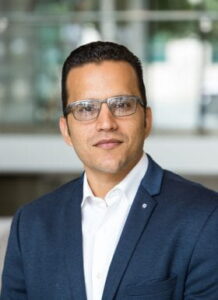Known for decades as a world-class center for research and studies on Alzheimer’s disease, Washington University continues to increase its outreach across the globe with new programs that may help detect and treat the condition many refer to as “the thief of the mind.” A family history of the disease is one of several risk factors being studied.
In 2019, the Dominantly Inherited Alzheimer Network (DIAN), an international enterprise designed to follow families with dominantly inherited Alzheimer’s disease (DIAD), launched the DIAN-LatAm initiative. The goal: to identify new DIAD families from Latin American countries and offer research opportunities and experimental therapies to prevent, delay, or treat Alzheimer’s. The DIAN is based at Washington University.

“Since its inception, the DIAN-LatAm network has identified genetic counseling and testing as a critical component of family support in the region,” said Jorge Llibre-Guerra, MD, assistant professor of neurology at Washington University. “To date, however, no genetic counseling and testing programs have been fully implemented in Latin America.”
Llibre-Guerra and his colleagues from Latin America saw an opportunity to address this problem. After testing and piloting a novel design with colleagues at the University of Antioquia, Colombia, and with funding from the university’s Global Incubator Seed Grant Program in 2021, he worked with colleagues at the University of Chile and the Centro de Neurologia, Fleni, Argentina to identify DIAD families in the country and evaluate genetic counseling as a suitable approach. The genetic counseling sessions included a culturally sensitive component developed with local experts.
With a positive project outcome and subsequent support, Llibre-Guerra went on to establish similar protocols with researchers from the University of Antioquia, Colombia; Instituto Nacional de Neurologia, Mexico; and the University of São Paulo, Brazil. The group focused on exploring attitudes toward genetic testing and the impact of finding a disease-causing mutation for early-onset Alzheimer’s in Latino populations.
“The Latin American genetic counseling and testing (GCT) program allows us to evaluate the emotional state, presence of support networks, and experiences of families at risk,” said Pablo M. Bagnati, MD, Lead Project investigator,Centro de Neurologia, Fleni, Argentina. “The GCT program helps family members to make an informed decision about their genetic status and adapt to the medical and psychological implications of the disease.”
The genetic counseling program has now been implemented in Chile, Argentina, and Colombia, Llibre-Guerra said, with ongoing efforts to initiate the protocol in Mexico and Brazil.
“Pre-symptomatic genetic testing for individuals with dominantly inherited Alzheimer’s disease is now attracting interest due to the existence of therapeutic trials available to this population,” Llibre-Guerra said. “Although the safety and main drivers influencing the decision to seek genetic testing have been widely studied in high-income countries, many questions remain relatively unknown in low-income countries or settings. These include Latin America, where educational level, religious principles, and cultural beliefs, among others, may pose different challenges for genetic testing and counseling.”
The knowledge gained from these collaborations, coupled with the robust research that Washington University conducts with its international partners, may lead to therapeutic options to detect and treat DIAD at its earliest stages—or prevent it all together.
Jorge Llibre-Guerra’s research examines the epidemiology and genetic pathways implicated in neurodegeneration, early markers of dementia, dementia prevention, and clinical trials in dementia. He serves on the university’s DIAN Observational Study Leadership team.
The DIAN-LatAm initiative is funded by the Alzheimer Association. The DIAN-LatAm initiative includes active sites in Mexico, Brazil, Argentina, and Colombia. The DIAN research leadership team plans to enroll at least 80 individuals living with DIAD through these sites. Comparing this population’s cognitive assessments and brain scans with those of other DIAN participants promises to yield valuable insights into how race, environment, genetics, and other factors may contribute to brain changes, age of onset, and rate of cognitive decline.
Advances in the field of Alzheimer’s
Little was known about Alzheimer’s disease until the 1970s. In that decade, clinicians and investigators at Washington University began to unravel the complexities of a disease now known to be the most common cause of dementia. Explore more about the university’s history of major advances in the field.